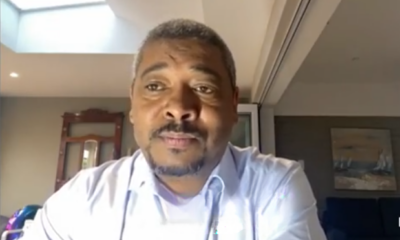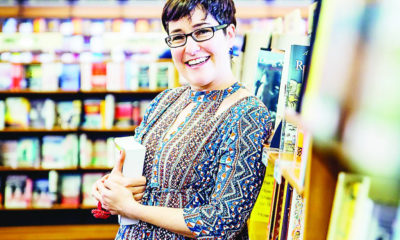
Featured Item

Boycott of Jewish authors on BookTok a disturbing plot
“Boycotting authors because they are Jewish isn’t the flex people think it is. It’s hateful, and no matter what you believe should happen in Gaza, there’s no reason to single out Jewish authors. There was another moment in history when Jews were singled out: the Holocaust.”
So says Kathleen Schmidt, the American founder and chief executive of Kathleen Schmidt Public Relations, and a well-respected voice in book publishing.
However, early last year, a list called “Is your fav author a Zionist” went viral, with many Jewish and non-Jewish authors arbitrarily being put into a category depending on what they had said, not said, or which characters had appeared in their books.
The spreadsheet, created by an X user named Amina, compiled social media posts, public statements and close readings to sort authors into categories: “Pro-Israel/Zionist”; “Pro-Palestinian/Anti-Zionist”; and various shades of “It’s complicated”, including “Both sides-ing it”.
The list, which has been seen by more than a million people in less than a year, has left many Jewish and non-Jewish authors feeling isolated from their literary communities.
BookTok – the literary subsection of TikTok – which created a flourishing community where any reader could find their niche, has been poisoned by the rhetoric of not supporting authors who are Jewish or have shown support for Israel.
If an author is labelled “Zionist” for whatever reason – be it being Jewish and having visited Israel; voicing public support for Israel; or just posting something advocating for the hostages – BookTok readers opposed to those views are urged to boycott that author. That includes not only not purchasing the work of that author but also unfollowing them on social media and not sharing the author’s work on social media.
“Boycotts definitely make a statement and can spur change, but they can also shut down the conversation,” says Dr Jordan Moshe, literary fiend and deputy principal, senior English, and halacha teacher at Yeshiva College. “Charles Dickens, for instance, changed his portrayal of Jewish characters after receiving a critical letter from a Jewish reader, Eliza Davis, who accused him of being selectively charitable and excluding Jews from his sympathies. This shows that constructive feedback can sometimes achieve what boycotts aim for – awareness and the correction of biases.”
“It’s a shame that these authors have been excluded from the conversation,” says word-lover and avid reader, Batya Bricker. “Excluding a whole swathe or a whole kind of group of authors and what they’re saying tends to narrow that, and you know you’re in greater danger of being in an echo chamber.”
Schmidt, whose firm focuses on authors, publishers, and publishing, wrote on her Substack in May 2024 that the act of calling out and boycotting Jewish authors was antisemitic. “If you don’t believe in book bans, you shouldn’t be okay with boycotting authors for being Jewish. What troubles me the most about this is the silence from publishers, who should try to ensure that the authors on the list know they have support.”
One of the most widely known fantasy authors on TikTok, Sarah J Maas, the author of the A Court of Thorns and Roses series, has faced mass backlash not because of the content of her books or her political affiliations but because she’s Jewish, has visited Israel, and her novels have characters that conquer other lands.
Similarly, popular romance author Nicholas Sparks appears on this list because he posted a “pray for Israel” graphic on his social media feed after Hamas attacked the south of Israel on 7 October 2023.
Another non-Jewish author, Taylor Jenkins Reid, of The Seven Husbands of Evelyn Hugo and Daisy Jones and the Six fame has been boycotted through such lists and social media posts. In December 2023, Reid posted a reel to her Instagram story featuring Yaakov Argamani, the father of former hostage Noa Argamani.
Furthermore, Gabrielle Zevin has been placed on these lists not only because she has Jewish heritage, but has been placed firmly in the Zionist – meaning boycott – category because her novel Tomorrow and Tomorrow and Tomorrow has Jewish protagonists and most notably an Israeli character.
Jewish novelist Talia Carner told the Jewish Telegraphic Agency after the list went viral, “It’s not for me. It gives me agita. The antisemitism is eating me.”
However, it’s not enough for those advocating boycotts of authors to discriminate because of the authors themselves, it’s also about where they choose to publish their stories. Having an Israeli publisher and having your novels translated into Hebrew is enough to get on anti-Israel BookTok’s hitlist.
Popular authors on BookTok like Emily Henry and Holly Jackson have been labelled “Zionist” and thus boycotted because they choose to have their books published in Israel.
Says Bricker, “To stop reading things that make you uncomfortable or you don’t agree with, or that come from a place that doesn’t align with your values is a real shame. Books and reading lead to deeper understanding, to living vicariously, to trying on ideas that maybe aren’t your own, expanding your worldview, and enhancing your perspective of life.”
South African author Ben Freeman says, “The publishing industry has made it clear that proud, Jewish and Zionist voices aren’t welcome. This has an impact not only our opportunities to work and our abilities to earn a living, it effectively silences us. I found out that Amazon refused to advertise my new book, The Jews: An Indigenous People, for a month because of the conflict. To combat this, the Jewish community must support its authors and the wider publishing industry must reflect on its racist stance that erases Jewish voices.”
Says Moshe, “Reconciling Jewish identity with literature that portrays us unfavourably is extremely hard to grapple with. Sometimes, I’ve felt betrayed reading authors who have openly maligned Jews, questioning if engaging with their work compromises my values. However, I’ve developed a method of resistance, not by shunning these books, but by embracing them defiantly, reading as if reclaiming them from their prejudiced creators. This act of defiance allows me to acknowledge the complexity of literature that both disturbs and delights.”










